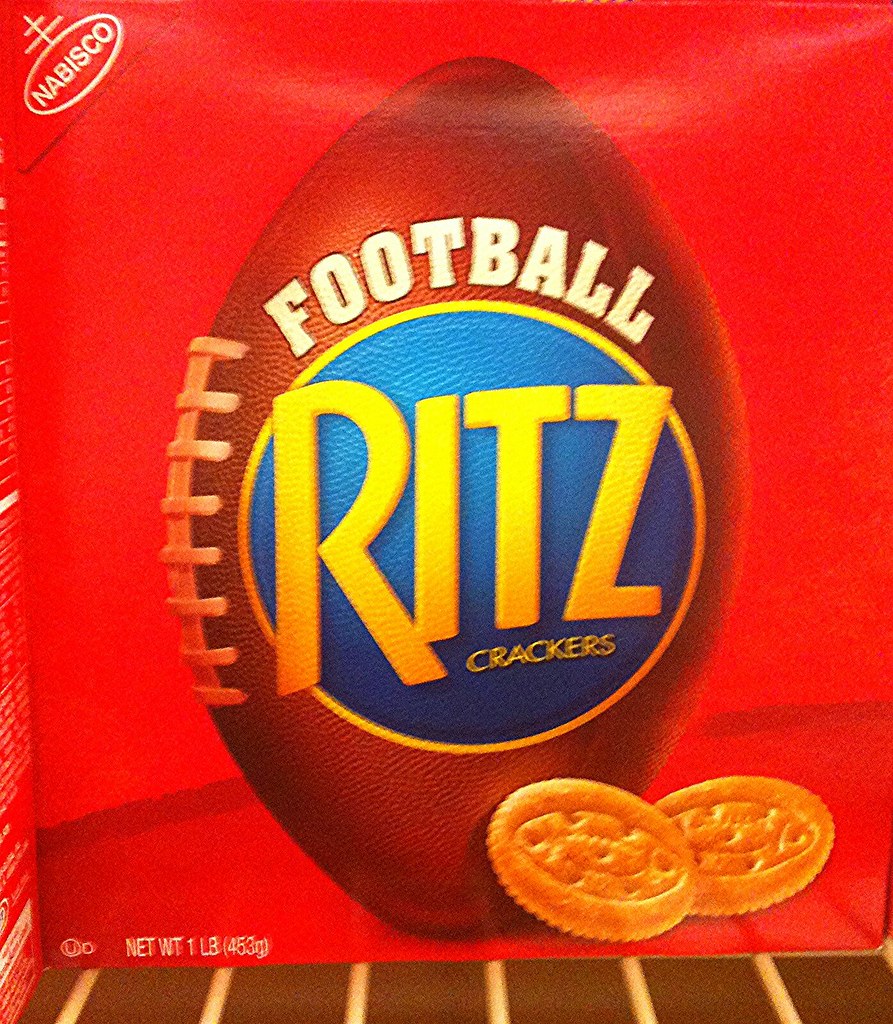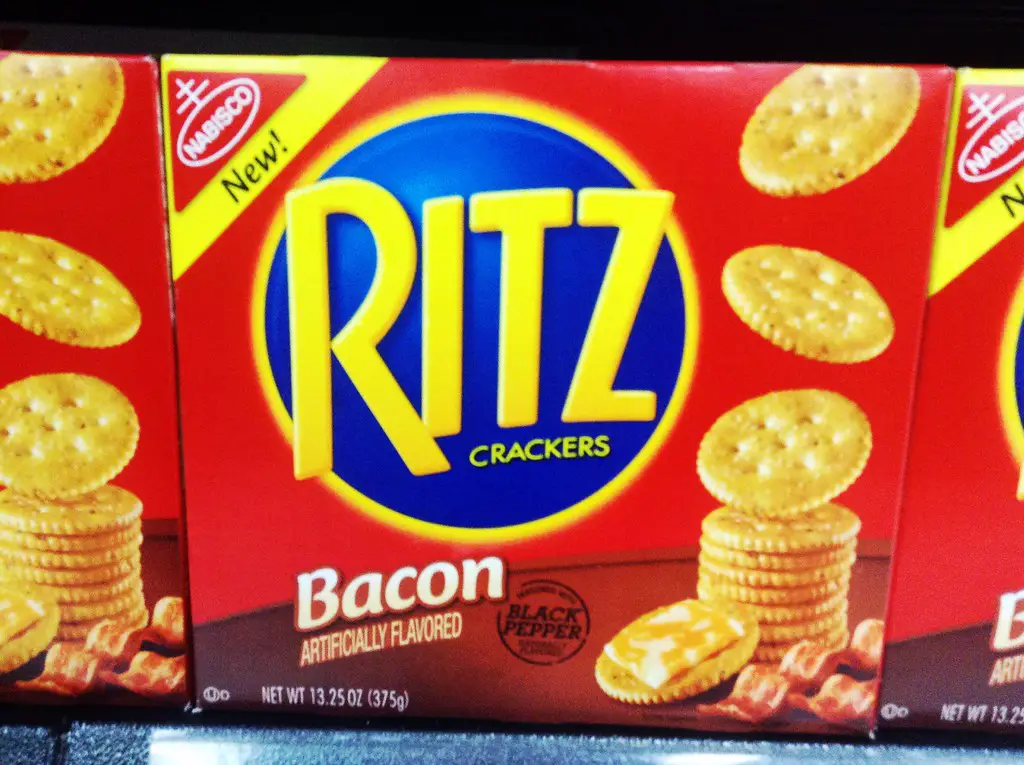Ritz crackers are a common snack in many households. They are mostly served with toppings like peanut butter, roasted banana pepper, cheese, or jelly. They are delicious, and you might wonder if you can share them with your dog. So, can dogs eat Ritz crackers?
Can Dogs Eat Ritz Cracker
Dogs can eat Ritz crackers but not regularly. This is because Ritz crackers contain ingredients like salt, sugar, carbohydrates, gluten, flavorings, seasonings, onion, and garlic, which are not safe for dogs. However, they have some nutritional benefits to your dog, but the health risks outweigh them.
Ritz cracker ingredients that are toxic to dogs

Salt
A serving, or five Ritz crackers, has 105 mg of salt. Your dogs might exceed their daily salt intake if they eat five Ritz crackers daily.
Avoid giving your dog food or treats that are heavy in salt if they have high blood pressure, heart illness, liver disease, or kidney disease. This could make their health worse. In addition, it is advised to refrain from giving Ritz crackers to older dogs because they are more susceptible to these health issues.
Salt toxicity can result from consuming too much salt. Symptoms of canine sodium toxicity include:
- Nausea.
- Diarrhea.
- Vomiting.
Also, you should not give your dog salt exceeding 1.5 grams per pound of body weight. Exceeding this limit could be harmful and deadly.
Vegetable Oil
Ritz crackers are prepared using vegetable oil that I s not safe for dogs. Dogs should not consume them because of the vegetable oils used in their production. For instance, soybean, canola, palm, and partially hydrogenated cottonseed oils are among the vegetable oils used in Ritz crackers. None of these are safe for canines.
Below are the types of oil recommended for dogs;
- Coconut oil
- Olive oil.
- Flaxseed oil.
Additionally, some canines may have soy allergies. Dogs with a soy allergy should not consume even a piece of Ritz cracker.
Symptoms of dog soy allergy include:
- Diarrhea.
- Vomiting.
- Eyelids inflammation
- Ear infection
Sugar
Five Ritz crackers contain five grams of sugar. This may not sound like much, but for our sensitive furry pals, this is a lot of sugar. It leads to long-term issues like diabetes, weight gain, and changes in metabolism while interfering with medications! It can also lead to dental problems.
Leavening Agents
Yeast, baking soda, and baking powder are all leavening chemicals that are bad for dogs. Ritz crackers’ leavening ingredients have the potential to harm our canine pals in the following ways:
- Heart problems.
- Seizures.
- Spasms.
If you suspect your dog has eaten some Ritz crackers, take him to the doctor ASAP because these signs and symptoms don’t always appear immediately.
Fructose corn syrup
High fructose corn syrup is sweeter than sugar. Dogs should not consume any kind of sugar, including high fructose corn syrup.
High fructose corn syrup is also artificial. It is heavily processed and might potentially have contaminants like mercury, which the FDA does not regulate. Additionally, it is a sweetener that can harm a dog’s teeth.
Unbleached enriched flour
It is the major component of Ritz crackers and can give dogs with gluten allergies an allergic response. Diarrhea, vomiting, intestinal and paw pad irritation, and skin rashes are a few of the symptoms.
Seasonings
Many crackers contain flavors like chives, onion powder, or garlic powder that are hazardous to your dog. These harmful chemicals might cause stomach distress or major health problems.
3 Cracker Types That Are Occasionally Safe for Dogs
Although homemade or store-bought dog food is the greatest choice for your pet, you can occasionally give your dog crackers. Read the packaging to buy crackers that are;
1. Plain: Dog owners should buy plain crackers free of flavor or other harmful additives to canines.
2. Low in sugar: Verify the ingredients to ensure the crackers are low in sugar but stay away from any that include artificial sweeteners that are poisonous to dogs, including xylitol.
3. Unsalted: Search for unsalted crackers or check the nutritional information to see whether the crackers have less sodium.
Are Ritz crackers good for dogs?
If you feed your dog Ritz crackers in moderation, he can benefit from the following nutrients;
Calcium
An essential vitamin called calcium aids in the development of healthy bones and teeth. Additionally, calcium aids in blood clotting and supports muscle growth and contraction. It is also necessary to the cell’s functioning and can guard against rickets, twitching muscles, and restlessness.
Protein
One serving size contains 1 gram of protein. Protein gives your dog energy and aids in the development of its muscles. Additionally, it makes individuals feel satisfied for a longer time.
However, dogs can still acquire protein from canine-friendly foods like chicken or eggs instead of Ritz crackers.
Iron
Iron is a crucial nutrient that aids in the transfer and storage of oxygen and numerous other biological processes, and it can help prevent anemia. Normally, beans and leafy greens are good sources of iron, but if your dog develops anemia, an iron supplement might be prescribed by a vet.
FAQs
Are Ritz crackers good for puppies?
Ritz crackers are bad for puppies, just like they are bad for dogs. During their growth and development, puppies need a nourishing, well-balanced diet, and giving them Ritz crackers can be harmful. Ritz crackers should not be given to your puppies because they are loaded with gluten, salt, sugar, and carbohydrates.
Can dogs eat graham crackers?
Yes, dogs can eat the popular sweet cracker known as graham crackers! Dogs like a little sugar, just like people do. However, too much sugar can harm their health since it can cause weight gain, dental issues, a faster heartbeat, and high blood sugar levels.
Can Dogs Eat Goldfish Crackers
Dogs can eat a few pieces of goldfish snacks without any problems. However, they contain a lot of salt and carbohydrates, which are harmful to your dog and should be given in moderation. If you give your pooch a diet high in salt or carbohydrates, it could eventually have a negative impact on his health.
Conclusion
Most Ritz crackers are not safe for dogs because of their ingredients. Luckily, it is not a must we feed Ritz crackers to our dogs as food or treats. Even though Ritz crackers have nutritional benefits, their health risks outweigh the benefits.

